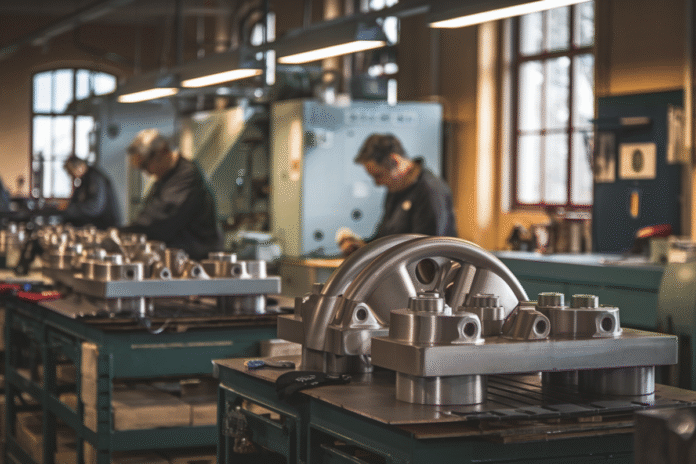“This facility redefines what a factory can be.” The world of manufacturing is evolving, and traditional factories are increasingly being transformed into multi-functional spaces that engage the public. In a bold move, a newly upgraded facility has taken this transformation to the next level, combining cutting-edge production capabilities with immersive educational experiences. This unique approach not only enhances customer engagement but also fosters a deeper appreciation for the craftsmanship and technology behind the machines. How does this innovative model impact the future of manufacturing and consumer interaction?
As industries strive to remain competitive, the integration of experience centers and museums within manufacturing facilities presents a compelling case for redefining customer relationships. By allowing enthusiasts and customers to interact directly with machinery, companies can cultivate a community of informed advocates who appreciate the intricacies of production. This shift reflects a growing trend where transparency and education are prioritized, encouraging consumers to connect with brands on a more personal level. What implications does this have for the broader manufacturing sector, and how might it shape consumer expectations in the years to come?
The Evolution of Manufacturing Spaces
The transformation of manufacturing facilities into interactive spaces marks a significant shift in how products are created and perceived. Historically, factories were viewed as utilitarian environments focused solely on production efficiency. However, the modern landscape is witnessing a paradigm shift where these spaces are evolving into vibrant hubs for innovation and education. This evolution is driven by a desire to demystify manufacturing processes and showcase the artistry involved in creating complex machines.
For instance, the integration of museum-like elements within factories allows visitors to explore the history and technology behind the production. Interactive displays and guided tours provide insights into the manufacturing process, from design to final assembly. This educational approach not only enhances customer knowledge but also fosters a sense of pride in the products they purchase. By bridging the gap between production and consumer experience, manufacturers can create a more informed customer base that values quality and craftsmanship.
The implications of this evolution extend beyond mere consumer engagement. As companies invest in these upgraded facilities, they also position themselves as leaders in innovation and sustainability. By showcasing their commitment to transparency and education, manufacturers can differentiate themselves in a crowded marketplace. This strategic positioning not only enhances brand loyalty but also attracts a new generation of consumers who prioritize ethical and sustainable practices in their purchasing decisions.
Creating Immersive Customer Experiences
The incorporation of experience centers within manufacturing facilities is revolutionizing customer interactions. These centers serve as immersive environments where visitors can engage with products firsthand, gaining a deeper understanding of their functionality and design. By allowing customers to touch, test, and interact with machines, companies can create memorable experiences that resonate long after a visit.
For example, hands-on workshops and demonstrations enable participants to witness the intricacies of machine operation. This interactive approach not only enhances product knowledge but also fosters a sense of community among enthusiasts. As customers share their experiences and insights, they become advocates for the brand, spreading awareness and enthusiasm within their networks. This grassroots marketing strategy is particularly effective in an age where word-of-mouth and social media play pivotal roles in shaping consumer perceptions.
Moreover, the emotional connection forged through these experiences can lead to increased customer loyalty. When individuals feel personally invested in a brand, they are more likely to become repeat customers and recommend the products to others. This shift from transactional relationships to emotional connections underscores the importance of creating engaging environments that resonate with consumers on a deeper level.
The Role of Technology in Enhancing Engagement
Advancements in technology are playing a crucial role in enhancing the customer experience within manufacturing facilities. The integration of virtual and augmented reality tools allows visitors to explore complex machinery in an interactive manner. These technologies can simulate various operational scenarios, giving customers a hands-on understanding of how machines function.
Furthermore, digital interfaces and mobile applications can enhance the visitor experience by providing real-time information and personalized content. For instance, visitors can access detailed specifications, maintenance tips, and even virtual tours through their smartphones. This seamless integration of technology not only enriches the educational experience but also aligns with the expectations of a tech-savvy consumer base.
As manufacturers embrace these technological innovations, they position themselves at the forefront of industry trends. By leveraging technology to create engaging experiences, companies can attract a wider audience and maintain relevance in an ever-changing market. This proactive approach not only enhances customer satisfaction but also fosters a culture of innovation within the organization.
Implications for the Future of Manufacturing
The integration of museums and experience centers within manufacturing facilities signals a significant shift in the industry. As companies prioritize customer engagement and education, the traditional boundaries of manufacturing are being redefined. This transformation presents both opportunities and challenges for manufacturers as they navigate the evolving landscape.
On one hand, the ability to connect with customers on a personal level can lead to increased brand loyalty and advocacy. By fostering a deeper understanding of their products, manufacturers can cultivate a community of informed consumers who appreciate the craftsmanship involved in production. This shift not only benefits individual companies but also enhances the overall perception of the manufacturing sector.
However, the challenge lies in maintaining the balance between production efficiency and customer engagement. As manufacturers invest in these upgraded facilities, they must also ensure that operational processes remain streamlined and effective. Striking this balance will be crucial for long-term success as companies adapt to the changing expectations of consumers.
The future of manufacturing is poised for transformation as companies embrace this innovative approach. By redefining the role of factories and prioritizing customer engagement, manufacturers can create a more transparent and connected industry. This evolution not only benefits businesses but also empowers consumers to become active participants in the manufacturing process, shaping the future of the sector together.


